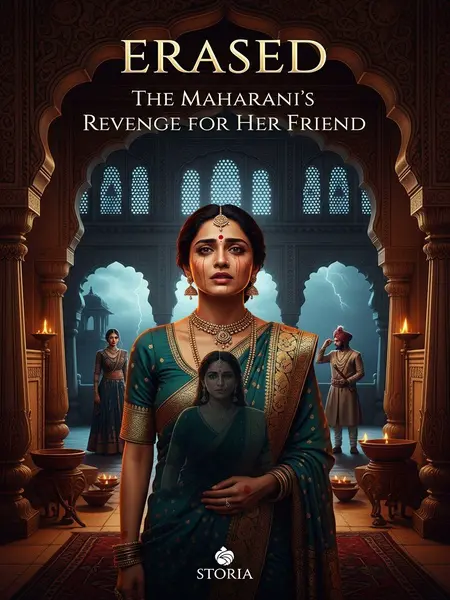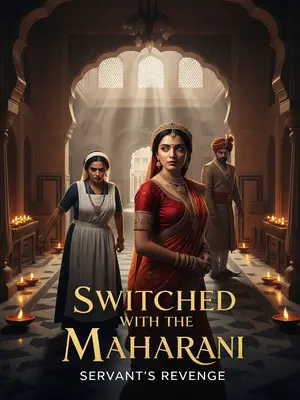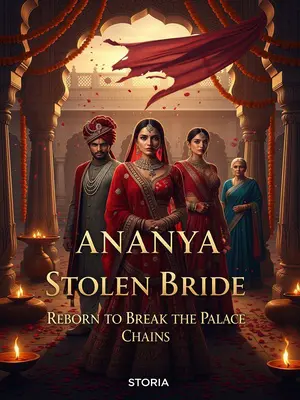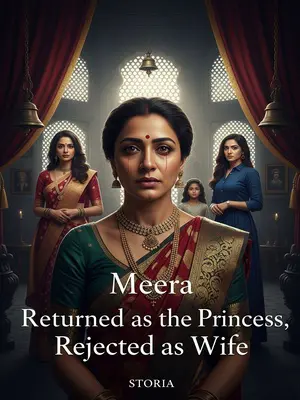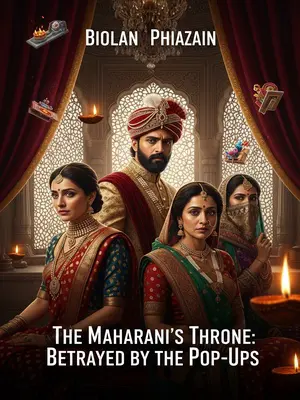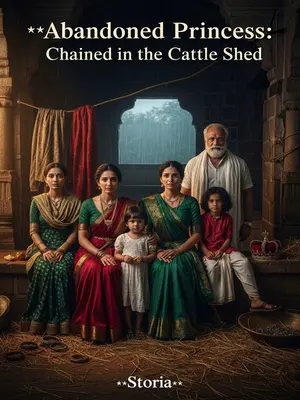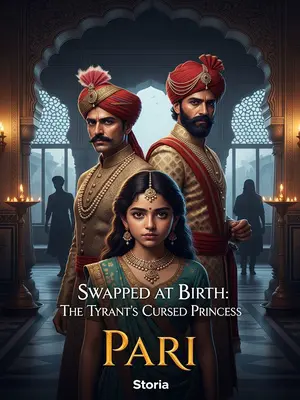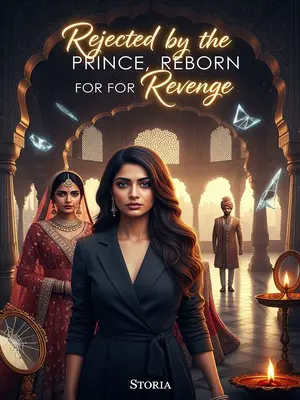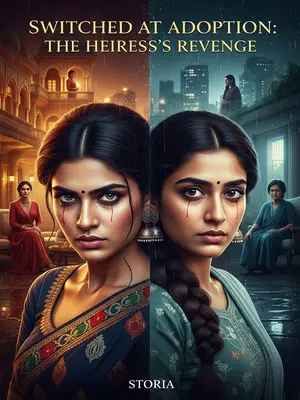Chapter 3: Childhood Lessons and Other Worlds
The one who acted was Devendra Singh. The servants dared not say it, but there was only one person in the world who would dare lay a hand on me: Devendra Singh. He did not dare see me. He merely sent an official letter posthumously conferring the title of Grand Princess upon Meera.
The parchment was crisp, the royal seal pressed deep into the wax. I tore the letter to shreds with the gold hairpin Devendra Singh had once given me.
Palace maids knelt everywhere. Chandra Mahal was silent until Devendra Singh arrived. Even the peacocks in the garden seemed subdued. Devendra entered quietly, the tap of his shoes barely audible on the marble floor. “Priya, Meera is already dead. If you are dissatisfied, I can grant her an even higher honour.”
“If I kill Sneha and posthumously confer the title of Maharani on Meera, what do you think?”
Devendra Singh said nothing.
“I want them buried with her.”
“Impossible.”
“Fine.”
My reply was unusually swift. Devendra Singh did not expect it, and looked up at me in surprise. His eyes widened behind his glasses, searching my face for any sign of a trick. “What did you say?”
“I said, ‘fine.’”
I will do it my own way. I forbade anyone from setting up a condolence meet for Meera. None of them were qualified. Then I sent people to reclaim everything related to Meera. No diyas were lit, no garlands strung in her memory. The priest waited outside the palace gates, confused, while the city gossiped restlessly: What sort of family refuses shanti for the departed?
Raghav held his sword and refused. His knuckles turned white, but his resolve was useless against my word. Sneha knelt to the side, biting her lip hard, saying nothing. With just a wave of my hand, the attendants filed in, pinning Raghav down, his knees striking the marble floor with a heavy thud.
Back then, when he sought to marry Meera, he had also knelt before me like this. He and Meera had an affair, which I discovered. For Meera’s reputation, I forbade them from seeing each other. Raghav knelt before the entire family, begging me to allow their marriage. He wept openly, his tears staining the floor. Relatives whispered, glancing at me, but I stood firm. For Meera’s sake, I had to be the villain.
I did not nod. Even though he was close to Devendra Singh, it was impossible for him to obtain a royal marriage decree. At that time, I asked Meera,
“If you marry him, you cannot come back.”
Meera’s cheeks flushed slightly. She smiled shyly, looking down at her feet, the gold payals tinkling. “Priya, he said I will be his only one in this life. I want to try.”
“What if it’s a mistake?”
She looked up at me, determination glinting in her eyes. “Then let it be a mistake.”
Meera seemed gentle, but she was clever and stubborn—I knew this well. She was as determined to choose Raghav as she was resolute in leaving him. When we were young, she always taught me, “In the art of war, attacking the heart is best.” Her words still echo in my mind, softer than the evening breeze, but sharper than any blade. How ironic, that she herself became the battleground.
I was only eight then, when my step-sister stole the keepsake my mother left me—a silk dupatta. The silk dupatta smelled faintly of sandalwood and the talcum powder Amma used on me after my bath. It was pale blue, with silver embroidery—my mother’s last gift. I guarded it jealously, but that day, my sister took it and flaunted it among her friends.
I complained to my father. He said, “That dupatta was torn by a stray dog. I’ll buy you another later.” His words cut me to the quick, a careless dismissal. Later, passing by my sister’s room, I saw her showing off her new dupatta to the other girls, boasting about its beauty, its fine embroidery, and the precious stones on it.
Amid their exclamations, I took scissors and cut the dupatta on my sister into strips. The room erupted in chaos. The girls shrieked, scattering like pigeons at Diwali. When Father arrived, my sister was pinned beneath me, too shocked to cry. Only when she saw Father did she scream for help in fear.
I held the bloody scissors, calmly looking at Father. “The stray dog ruined my dupatta. Father, remember to buy me another.” Perhaps my gaze was too calm. Father actually forgot to scold me. I walked out, step by step, along the wide path everyone made for me.
The maids watched with wide eyes, their hands pressed to their mouths. My steps echoed, heavy and triumphant, like a queen returning from battle. The next day, an identical silk dupatta was delivered to my room. I heard that my sister’s mother had to empty her savings just to heal her daughter’s injuries. After that, I never saw her near my room again.
Stories about me spread throughout the city, saying I was cruel and bloodthirsty, often sneaking out at night to harm people. It was then that Meera appeared by my side. She arrived with a basket of fresh guavas, smiling fearlessly. While other children shrank away, she plopped down beside me and offered me a slice, as if I was any other girl. From that day, she never left.
The daughter of the local MLA once pushed me into the pond. I grabbed a rock, climbed ashore myself, and threw her into the water. She nearly lost her life. The MLA petitioned the king, demanding my father punish me severely.
The king inquired about the incident, but no one dared testify for me. Only Meera stepped forward. “It was Miss Lakshmi who was rude to Miss Priya first. If there is to be punishment, it should be equal.” Her voice rang clear, unwavering. The king understood the whole story and did not punish me. Instead, he ordered the MLA to discipline his own children strictly.
Before, I only knew that if someone bullied me, I would destroy them. But Meera taught me not to punish others at my own expense. It’s not worth it. Make others suffer, but never let them blame you. Her logic was simple, practical—very desi. She always said, "Beta, make sure others are crying, not you."
I warned her not to come near me. “I am poisonous.”
Meera did not listen. “It’s fine, I come with my own antidote.” Her grin was mischievous, her confidence infectious. Later, whenever I got into trouble, Meera always cleaned up after me. No one called me cold-blooded anymore. They all said I was a pitiful child who lost her mother, bullied by my aunt and sister.
I once asked Meera why she helped me. Meera said, with my reputation and family, maybe one day I could marry into the royal family, and she wanted to hold onto my saree pallu. I did not believe her.
Until I came of age and was engaged to the Crown Prince, Meera finally told me the truth. She said she was from another world, and came here only to save me. If she did not intervene, I would destroy the entire kingdom. Now that my life was back on track, she was preparing to leave.
I almost laughed—was she like those serial bahus who come back from the dead? But her eyes were steady, and I remembered how she always knew what would happen before anyone else. Meera said, when her body here died, she would return to her original world. She liked it there very much, and I could not keep her by force.
It was Raghav who made her stay. At the time, I was also happy for her. But I never imagined there would be a Sneha.
I would not let them erase Meera. Not while I still breathed.
